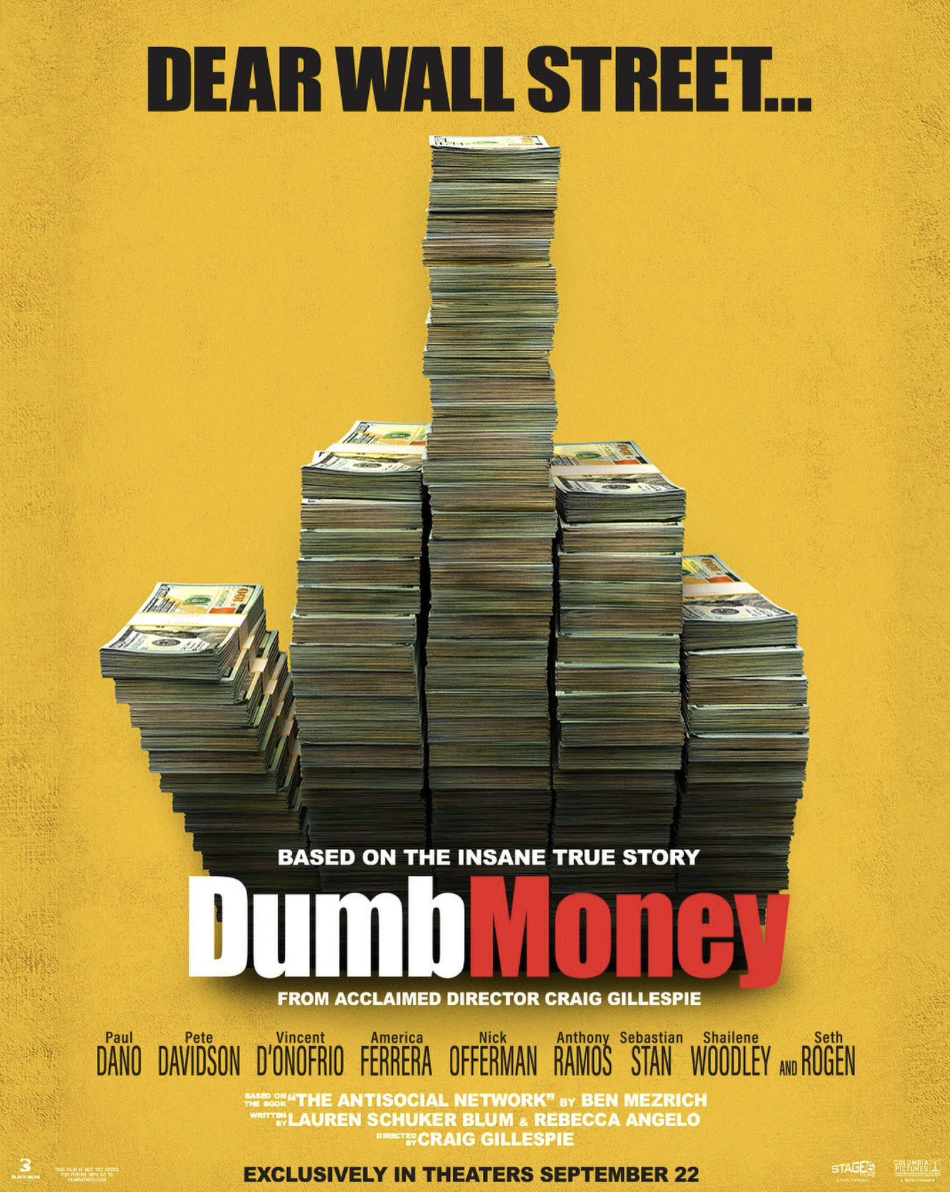Just a few weeks ago, I went to my local theater to see “Dumb Money,” a movie based on the GameStop short squeeze fiasco that occurred in early 2021. The film follows Keith Gill (Paul Dano), a financial analyst from Massachusetts, as he navigates newfound wealth and fame after people begin to latch onto his financial strategies and succeed from them. The film bears an all-star cast filled with A-Listers such as the aforementioned Dano, Pete Davidson, Seth Rogen, America Ferrera, Sebastian Stan and more.
Movies such as “Dumb Money” have recently found widespread success not only critically, but financially as well. Look no further than Christopher Nolan’s summer phenomenon “Oppenheimer,” a critical darling and surprise box-office smash hit, reaching nearly $1 billion over the course of its theatrical run. The two movies, while both aesthetically and tonally very different, surprisingly sit under the same genre of movie: a biopic.
Simply put, a biopic is a visual biography that bases the content of the film around the life of a real person (or people). In “Dumb Money,” while the perspective shifts many times throughout the movie, the focus mainly stays on Gill. In “Oppenheimer,” the focus is entirely on Cillian Murphy’s character J. Robert Oppenheimer, a theoretical physicist mainly credited with the creation of the first atomic bomb. These biopics are also known for their heavy award appeal. Since 2012, seven actors have won the Academy Award for Best Actor for their portrayal of real people, including Daniel Day-Lewis in “Lincoln” and Rami Malek as Freddie Mercury in “Bohemian Rhapsody.” But with all this attention comes an important discussion on whether these biopics deserve to be made or not.
Obviously, the content of each film will differ based on the subject as problems begin to arise when taking different views of a single person. Take the two different portrayals of Elvis Presley in two very recent biopics: Austin Butler in Baz Luhrmann’s “Elvis” (2022) and Jacob Elordi in Sofia Coppola’s “Priscilla.” In “Elvis,” Butler’s performance is most likely heavily influenced by Luhrmann’s direction, which is well known for being over-the-top and zany. The film mostly sees Presley as an over-the-top showman, which, while correct in ways, some come to see that it may not be the full picture. Another perspective comes from “Priscilla,” and while not yet released in the United States, the trailer portrays a more nuanced take grounding the relationship between Priscilla and Elvis, recognizing the young age that Priscilla was when she first met Elvis. In Luhrmann’s adaptation, this is mostly glossed over even though it was incredibly important to both of their lives.
Another point to touch on is accuracy. As fictionalized accounts of real events, this will come with sensationalized accounts that do not reflect the accurate story as it truly happened. In order to get a more accurate representation, many films are based on biographical books. The two movies brought up earlier: “Dumb Money” and “Oppenheimer” were both based on books. “Dumb Money” was based on Ben Mezrich’s “The Antisocial Network” and “Oppenheimer” was based on Kai Bird and Martin J. Sherwin’s “American Prometheus.” While not perfect, these films can generally be seen as more accurate as compared to others that may not be based on such material, like the aforementioned “Elvis” and “Bohemian Rhapsody,” both of which were written with no credited source material.
Next comes to whether a biopic’s focal person deserves to be in the spotlight or not. For example, two biopics based on the life of serial killers have been made by Netflix: “Extremely Wicked, Shockingly Evil and Vile,” starring Zac Efron as Ted Bundy and “Dahmer – Monster: The Jeffrey Dahmer Story,” featuring Evan Peters as Jeffrey Dahmer. These two pieces of media, especially “Dahmer,” helped foster a glorification of these serial killers; people who really should be forgotten for their heinous crimes, and yet, by creating this content, we put killers on the same platform as musicians and tech pioneers.
This is not right. We should not be making light of the crimes of these killers and using it as entertainment. Instead, we should be listening to the stories of the victims and garnering sympathy through that means rather than seeing the perspective of the killer.
It is clear to me that biopics, while not inherently bad, should be approached with future caution. While they can be used to take a nuanced and unbiased perspective on a person’s life, it is a fine line to walk. A biopic succeeds when the film is able to take an unbiased approach on the person’s characterization and accuracy to true-to-life events. A biopic will fail when it becomes too sensationalized or it focuses on glorifying tragedy. What the biopic needs to understand is that humans are never perfectly good or astonishingly bad.
Life is complicated, and this complexity is hard to create on screen. But what I think the biopic succeeds most at, is making a jumping-off point for people to dive more into the situation presented in the film. People will see the movie, and then they will go home and research more if the content especially interests them.
To sum up, biopics are made as entertainment. They neither deserve nor do not deserve to be made. But the strength does not lie in the movie itself. Their strength lies in the story that you may have to dig a little more for. And so, while having their flaws, I think biopics are a good time. It can open eyes to stories that need to be told more.








